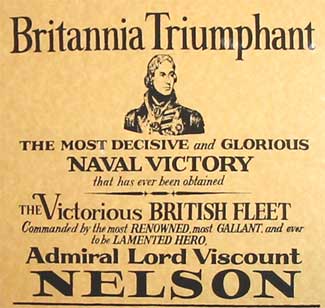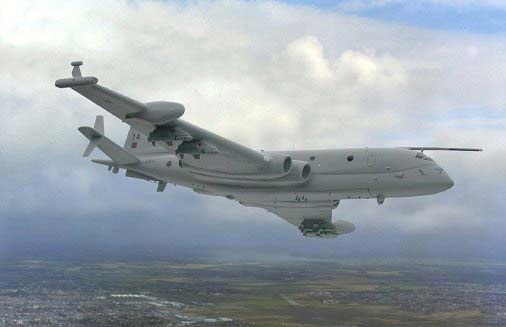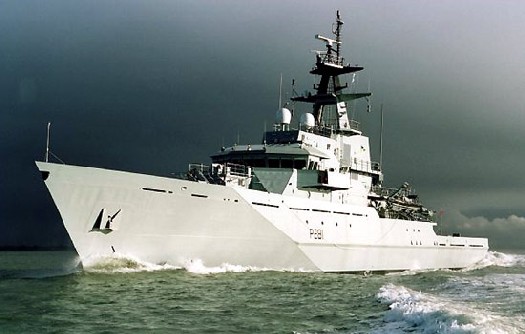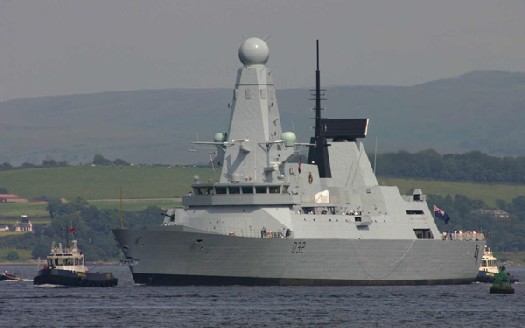 Today is the 1st anniversary of the online British Gazette. It is also the 205th anniversary of the Battle of Trafalgar. The one hundred years (to 1905) that followed saw the United Kingdom grow from a European power to a world superpower. The Royal Navy and its supremacy enabled this to happen. The fifty years (to 1955) that followed saw two disastrous world wars, national bankruptcy, loss of Empire and necessarily truncated armed forces. The next fifty five years (1955 – 2010) has seen the decline of this once Imperial power to the status of suzerain power of the European Union.
Today is the 1st anniversary of the online British Gazette. It is also the 205th anniversary of the Battle of Trafalgar. The one hundred years (to 1905) that followed saw the United Kingdom grow from a European power to a world superpower. The Royal Navy and its supremacy enabled this to happen. The fifty years (to 1955) that followed saw two disastrous world wars, national bankruptcy, loss of Empire and necessarily truncated armed forces. The next fifty five years (1955 – 2010) has seen the decline of this once Imperial power to the status of suzerain power of the European Union.
What were the causes? Several. They include the vanity of the British political establishment and the machinations of the USA. They also include US lobby groups – especially the supporters of Israel in the USA. However the start of the U.K.’s decline began on 2nd September, 1945. This was the day on which World War Two formerly and legally came to an end. At that point the U.K. was effectively bankrupt.
The next ten years British governments learned a necessary lesson: to be grateful supplicants to a mighty USA. The U.K. needed the USA’s money. British Gazette readers well know the phrase, “He who pays the piper, calls the tune.” Many readers may know that the same phrase can be applied to U.S. politics in general. For the next ten years (1945 – 1955) the U.K. had indeed to dance to the tune the USA played. In 1956 there was the Suez crisis – a military adventure with France and Israel against Egypt. This was done without US approval and the result was a British defeat, Eden’s resignation as Prime Minister and national humiliation. Eden’s replacement was Harold MacMillan. This was the point at which the “Special Relationship” between the USA and the UK could really be said to have started.
Harold MacMillan, along with most other British politicians (across the political spectrum) wanted to retain the country’s seat at the “top table.” British governments did not want to accept the status of being leaders of a modest European democracy. They basked in the status of being one of the “big five” permanent members of the Security Council of the United Nations that was the successor to the post WWI League of Nations on which the U.K. was one of the Great Powers. Central to the maintenance of the status of a Great Power was the possession of an independent nuclear deterrent. The U.K. had one but it needed to be replaced with a more modern one. The Skybolt missile under development for the USAF offered what the Air Ministry took to be the answer. But the programme was cancelled by the Kennedy administration. The Kennedy administration favoured the Polaris missile that was to be launched from a submerged nuclear submarine. This missile offered great advantages – it was very difficult for an enemy to find and destroy the submarine. The missile had a bigger warhead. The Polaris missile was the deterrent to have. Harold MacMillan desired it. President Kennedy was prepared to supply it, but had his price.
The US State Department – which employed professional diplomats and foreign policy experts with a knowledge of foreign affairs many times greater than the average American – had observed with growing concern the development of what started out as The European Coal and Steel Community in 1952 which resulted from the Schuman Declaration of 9th May, 1950 (later known as Europe Day). Then there was the Treaty of Rome in 1957. By the time Kennedy took office in 1960 it was clear to the State Department what was happening amongst six of NATO’s members in Western Europe. The State Department realised if European unification was achieved the USA would no longer have the status of primus inter pares (the first among equals) in NATO. This was something they did not wish to see. The professional diplomats were not however so stupid as to suggest that the new administration suggest to the Europeans that they thought their new organisation a “silly idea” and that the USA did not like it. Instead they hatched up “a cunning plan.” If the United Kingdom, Ireland and as many other countries as possible joined the new supra-national confederacy the process of European integration would be slowed, hopefully to a stop. The rationale was simple and obvious. The more members the more difficult joint decisions would become. The US State Department has persisted with this policy ever since. That is why they advocate so strongly for Turkish membership, Serbian membership, Ukrainian membership and any other county for that matter! It is exactly why British governments argue for an ever expanding union. British governments have known all along the innate hostility that many Britons have towards the EU.
Thus it was that Kennedy’s price for Polaris was for MacMillan to seek U.K. membership of the nascent European super-state. Had MacMillan not agreed there would have been no Polaris. It is also likely that Britain’s permanent seat of the Security Council would have been threatened.
Of course, the constitutional bar that was the 1688 Declaration of Rights will have been noted by the State Department. They will have told the British government to “work around it” – in other words, ignore it. Harold MacMillan felt he had little choice. He was in any event in sympathy with the new US President’s policy for he did not want to see a dominant European power and therefore convinced himself that the best way to avoid the problems posed by the creation of a European super-state was to become one of its members! Harold MacMillan was in the position of a hotelier agreeing with the local gangster to have his hotel turned into a brothel. The hotelier convincing himself that if the brothel was located in his premises he would at least have some influence over how the prostitutes were treated!
Had MacMillan had been less than receptive to Kennedy’s idea, the President had an “ace up his sleeve.” This was the knowledge that Harold MacMillan was bi-sexual. Kennedy knew this because his sister, Kathleen Kennedy had been married to the Marquess of Hartington (heir to the Devonshire dukedom) and the Hartington’s were frequent visitors in the 1930s to Cliveden in Buckinghamshire. It was at parties held there that the bisexual Prince George, Duke of Kent and a young Harold MacMillan and other young men of similar tastes arranged dalliances. Being bi-sexual in the Britain of today is not a problem for a politician. Indeed there are many who would suggest that it is an advantage! This was not the case in 1960.
Thus President Kennedy could hold both the carrot and a stick over MacMillan.
Since that time British Foreign and Defence policies have been made in accordance with US wishes. This is the Special Relationship. Britain’s position in NATO during the cold war was to be the number one cheerleader for the USA. Of all the NATO allies, Britain has nearly always followed US Foreign policy. A notable exception to this was Vietnam. The Labour government of Harold Wilson was the only post Suez (MacMillan onwards) government to refuse an American request to participate in military action. It is to be noted that the Australian government did participate in Vietnam. Refusal to participate in Vietnam had its price however. The US Department of Defense (US spelling) demanded the US State Department insist that the TSR2 advanced tactical strike and recognisance aircraft that was superior to its heavier, more complicated US competitor the F111 be included in the Labour government’s spending cuts. This was why Denis Healey ordered the airframes (one survives) to be broken up. He was doing what General Dynamics (the builder of the F111) wanted. Below is video footage of the TSR2. Its performance was phenomenal. It would have knocked the inferior F111 into a cocked hat. The footage informs the reader that the TSR2 with just one engine on reheat with the other on dry thrust could outrun the English Electric Lightening, one of the most capable interceptor aircraft of the day. Thus the RAF was to have a bomber that could outrun a world class interceptor but this was cancelled for an American aircraft which in no way could outrun a fighter aircraft – as was demonstrated in Vietnam.
Britain later cancelled this order purchasing the far more useful F4 Phantom for the RAF and the RN (Fleet Air Arm).
Britain’s possession of the Polaris and later Trident nuclear deterrent is said to be independent. This is true only in the sense that it is independent TO the US nuclear deterrent. It is not independent OF the US nuclear deterrent. When British ministers say “independent nuclear deterrent” they mean that the British design and build the nuclear warheads and builds the submarines and the RN mans them. Suffice it to say, were a British Prime Minister ever minded to order the use of Trident and the US President disagreed, the US would be able to prevent the launch. Trident is effectively a “dual key” weapon. This is known by all foreign governments. This means that were a British Trident missile ever to be used in anger the state on the receiving end would know that it was done with the complaisance of the USA. Trident is the most useless piece of weaponry in the U.K.’s armoury. It is also the last weapon system that any British government would cancel. Why? Because of an understanding that were the USA and the UK ever faced with a nuclear exchange, the UK would fire first. The deal being that the retaliation would fall on British cities before American cities. In other words: We die first. This is the Special Relationship.
Unlike Harold Wilson, Tony Blair was most willing to march to George Bush’s bugle call in Iraq and later, Afghanistan. Consider Blair’s position in 2003: The economy was O.K. The Labour government was doing O.K. in the polls. The Tories were nowhere (that was being led by Iain Duncan Smith). Politically, Blair would have been advised to go along with the French. He would have scored many Brownie points in Paris and Brussels that would have been useful. It would have been popular with the British people. Why then would that most pragmatic of politicians set his face against political common sense and support an unpopular and ridiculed (in Britain) US President? Answer: the Special Relationship.
What would happen were Britain to end the Special Relationship? No Trident. No permanent seat on the UN Security Council.
What would break the Special Relationship?
Withdrawing from the European Union. Cancelling Trident. Withdrawing our troops from Afghanistan.
All three actions would save billions and in the case of the last one, young British lives as well.
This brings us to the question: Why are Britain and America in Iraq and Afghanistan. Well there is more than one source to the answer. The first source lies with one man. Jawaharlal Nehru (14th November 1889 – 27th May 1964) Jawaharlal Nehru was a socialist and a leading Indian politician. In 1945 the USA was wanting Britain to quit India but wanted India to become a US ally to counter Russian expansion into the sub-continent. Jawaharlal Nehru had a non aligned socialist future mapped out for India and was not going to exchange British domination for American. This of course worried the US State Department. Thus it was that the US encouraged the separatists in the Muslim League to demand a separate Muslim state of Pakistan. Mohammad Ali Jinnah (25th December 25 – 11th September, 1948) the Muslim League’s leader would have stopped short of demanding a separate Muslim state settling for a substantial degree of autonomy but for US machinations for the State Department saw Pakistan as a buffer between India and Russia – and it still does.
Indeed it has been US policy to befriend and have allies in the Persian Gulf region. This resulted in the imposition of the Shah of Iran upon the Iranian people and US support for the oppressive regime of the House of Saud. Many will say because this is where the oil is. This is true.
Relations however between the US and these allies are complicated by one very large thorn in the side: Israel. This is of course the other Special Relationship. It is however a very different one from the one the U.K. has. Whilst the U.K. has been unkindly but accurately portrayed as being the U.S. poodle the canine metaphor has to be altered to describe the US – Israeli relationship. The best phrase to describe the Special Relationship between the USA and Israel is: “it is the tail (Israel) that wags the dog (USA).”
The US and British decision to invade Iraq and Afghanistan was to prevent in the case of Iraq from becoming a regional power that would threaten Israel and in the case of Afghanistan, of a fundamentalist regime destabilising the friendly Pakistan regime. Why? Because the consequences of not doing so are dreadful. Had Saddam Hussein acquired “weapons of mass destruction” Israel would have used nuclear weapons in the event of an Iraqi threat – they would NOT wait to be attacked. If Pakistan (a nuclear power) becomes a fundamentalist Islamic, in the event of an Pakistani threat – they would NOT wait to be attacked. Nuclear weapons would be used. This is the nightmare scenario.
This is why the U.K.’s entire defence strategy has been based around continuing the British presence in Afghanistan.
To describe the U.K.’s planned (post cuts) defence posture as lop-sided is to understate the matter considerably.
To the question, Is it designed to meet British needs? The answer is, Of course not! It is designed to meet US needs.
To the question, Surely the prevention of nuclear war is the first thing Britain should be focused on, and therefore maintaining our troops of Afghanistan is most important? The answer is this: It is an American problem. The US helped create and maintain the state of Israel. They will continue to do so whether British troops are in Afghanistan or not. If we leave the US will (under strong protest) replace their numbers with US troops.
As well as leaving the EU and having a foreign policy to suit British needs, this country’s own defence needs ought to be paramount.
What should a defence posture designed to meet British needs look like? The answer is this:
The Royal Navy should be the principal service arm. When this country was a world power (before 1914) the Royal Navy accounted for the lion’s share of the defence budget. This was because British trade which was by sea had to be protected. This is still very much still the case. Most goods coming and leaving this country go by sea. Whilst this is the case, the threats the country faces now are very different from 1914 and 1939. Then it was an aggressive and powerful Germany armed with powerful battleships and submarines. Today the threat is largely confined to two categories: (i). terrorism and (ii). drug smuggling. A principal weapon in these is the Nimrod Maritime patrol aircraft (below) of which the MR4 is the latest and most capable type. It is now a fully developed weapon system. All the development costs have been met. All that is needed is to manufacture the aircraft. Since only twelve were ordered the development costs had to be spread over this very small number. These twelve planes however are not now to be ordered. This is completely crazy. These are the aircraft that will keep watch over our shipping lanes. These are the planes that could detect a nuclear weapon being carried, hidden in a container on a containership. These are the planes that in single sortie can keep watch over thousands of square miles of ocean looking out for smugglers (of people and drugs).
It is now a fully developed weapon system. All the development costs have been met. All that is needed is to manufacture the aircraft. Since only twelve were ordered the development costs had to be spread over this very small number. These twelve planes however are not now to be ordered. This is completely crazy. These are the aircraft that will keep watch over our shipping lanes. These are the planes that could detect a nuclear weapon being carried, hidden in a container on a containership. These are the planes that in single sortie can keep watch over thousands of square miles of ocean looking out for smugglers (of people and drugs).
The Royal Navy needs a good number of cheap but capable offshore patrol vessels such as the River class below, to assist the Nimrods in their task.
So far as the strike fleet is concerned, the two carriers should be completed to the revised CTOL design and aircraft acquired for them at commissioning. These aircraft need not be the Joint Strike Fighter but a cheaper aircraft. The original number of twelve Daring class guided missile destroyers (below) should be reinstated, resulting in each carrier having its six strong escort flotilla.
How to pay for this? Scrap Trident now. That is to say, decommission the existing boats. The actual nuclear warhead could be put into store and redesigned as free fall weapons. Also, cuts in the size of the Army. This country should cease trying to be what it is not. A world policeman.
